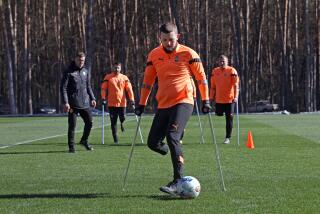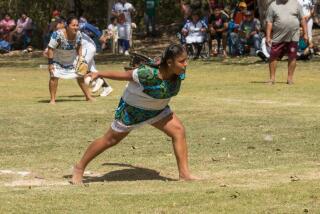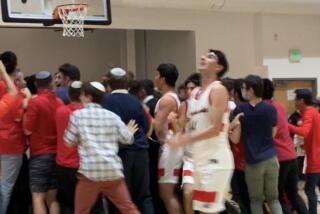Women’s basketball tries to rebound
SULAYMANIYA, IRAQ — The tallest player on the women’s national basketball squad is 5 feet 7 inches. She and her teammates cannot practice in the nation’s capital because of poor security. And in northern Kurdistan, where they are now based, they practice outdoors, often in frigid temperatures.
Nonetheless, what they lack in height they make up for in enthusiasm, said Deb Packwood, an American consultant hired to develop the fledgling team, which aims to raise its international profile and someday compete in the Olympics.
Packwood, who played some college basketball at Ouachita Baptist University in Arkansas, is working on behalf of the Iraqi Basketball Assn. and the National Olympic Committee, which are seeking to revive a sport that has been crippled by war, inadequate financial backing and the growing challenges women face in a nation that is increasingly religiously conservative.
“The people, they don’t like the girls to play,” said team member Rajwa Abdul Ahad, 28. “They say, ‘No . . . it’s bad for you.’ But I don’t care because basketball, it is in my blood.”
Since the blond, American athletic consultant from Global Sports Partners began making the rounds in Kurdistan this year, Kurdish television crews and local newspaper reporters have sought interviews and flocked to tournaments. At one school alone, 85 girls expressed interest in playing, although Packwood winnowed them down.
“I think we are the best place for women’s sports in all of Iraq,” said Rizgar Mohammed Raouf, a physical education professor at Sulaymaniya University and representative of the local basketball federation. “Our community believes in freedom more than being covered.”
But building the team hasn’t been easy, particularly when the participants lack basic skills and the coaches themselves have no formal training. Getting funding in the soccer-crazed, male-dominated country is also difficult, said Sameera Abdulla, head of the women’s sports office for the Kurdistan Olympic Committee.
But Abdulla said the head of the National Olympic Committee promised: “If I helped you before with one hand, I will help you now with two hands. Let me assure you, there is a chance for women.”
As in many other sports, the team is often overshadowed by the men’s basketball team.
With Abdulla’s assurance, Packwood and the women have moved full-tilt. This week the team traveled to Syria to compete in the West Asia Women’s Basketball Championship, an event that has received almost no media coverage. They were knocked out by Iran.
Since the 2003 U.S.-led invasion of Iraq, the ragtag national team has competed a couple of times in other Middle Eastern countries. The Iraqis were beat soundly by women who towered over them, sometimes losing by as many as 50 points.
“We cannot beat any team,” Abdulla said, “but I think we will get better.”
There’s just one other nagging issue, Packwood recently joked: “They really are lacking tall players here.”
Dunya Najat, 26, of Sulaymaniya did not begin playing until she went to college -- in part because her parents would not allow it. Now she is married to the basketball coach and plays on the national team. Her hope, she said, is that Iraq will become safer and that the team will be able to travel again to Lebanon and Jordan. And from there, who knows?
“I want to be famous,” she said. “I want to go to America to see how they play. I hope to see Michael Jordan and Shaquille O’Neal.”
Although the national team has several players in their 20s, coaches have their eye on young talent, girls who have expressed passion in the sport and persuaded their parents to let them play. This month, about 40 girls 12 to 14 years old have started practicing with eight new coaches.
Kausar Mahdi, 17, said she has loved basketball since seventh grade, but had been rebuffed by her father. “He said: ‘Care about your lessons. Care to go to a good college.’ But after three years, I asked my father again and he said, ‘OK.’ ”
She watched games at school and her father helped her put up a hoop at home. “I’m not really good,” she said. “I have to practice more.”
Farther north in Irbil, 14-year-old Romrama Shamael Nano dribbles and shoots in a brand-new gymnasium, where she joins other aspiring female basketball players. Their gym is the nicest in northern Iraq, but they can practice and compete only when their coach isn’t busy with his three other teams.
“I want to be a very good player,” Romrama said. With the completion of the new gymnasium, the players hope more tournaments will be scheduled so they can do more than just practice.
“Now we have an opportunity,” said Abdulla, of the Olympic Committee. “Kurdistan is free. It is different from the south and the middle. We want to make the Iraqi people be together, especially in sports.”
--
More to Read
Go beyond the scoreboard
Get the latest on L.A.'s teams in the daily Sports Report newsletter.
You may occasionally receive promotional content from the Los Angeles Times.








